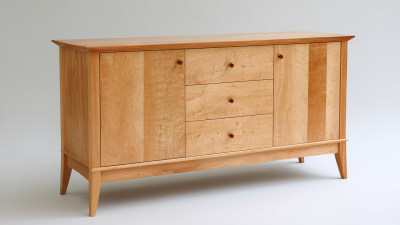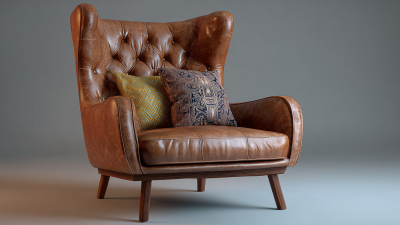Lounge Bench Versus Traditional Seating Which is Better for Your Space
As modern interior design continues to evolve, the debate between lounge benches and traditional seating has gained momentum. Recent studies indicate that lounge benches can significantly enhance the functionality and aesthetic appeal of various spaces. According to a report by the International Interior Design Association, 68% of designers favor lounge seating for its versatility and ability to create collaborative environments in commercial settings. Additionally, the use of lounge benches can improve space utilization by accommodating more individuals without compromising comfort. With their sleek designs and suitability for both formal and casual settings, lounge benches are becoming a preferred choice among homeowners and businesses alike. This blog will explore the advantages and considerations of choosing lounge benches over traditional seating options in order to help you make informed decisions for your space.

Lounge Bench: A Modern Twist on Traditional Seating Solutions
When considering seating solutions for your space, the lounge bench stands out as a modern twist on traditional designs, blending functionality with contemporary aesthetics. Unlike conventional seating options that often feel rigid and formal, lounge benches create an inviting atmosphere that encourages relaxation and social interaction.
Their versatility allows them to be used in various settings—be it a cozy corner of your living room or a stylish entryway—making them a perfect choice for those looking to enhance their interiors.
Moreover, lounge benches offer a unique opportunity for creativity in your design scheme. Available in diverse materials, colors, and styles, they can complement any décor while adding a touch of modern flair.
Unlike traditional armchairs or sofas that may limit your arrangement options, a lounge bench can be easily moved and styled to fit your needs.
Its streamlined silhouette and open seating allow for a more fluid use of space, inviting guests to gather and converse, thereby transforming your environment into a hub of comfort and style.
Pros and Cons of Lounge Benches in Your Living Space
Lounge benches have gained popularity as a versatile seating option in modern living spaces. Their design often promotes a casual and inviting atmosphere, making them an attractive alternative to traditional seating. According to a recent report by the Furniture Marketing Group, lounge-style seating can lead to a more relaxed environment, boosting social interaction by up to 30%. However, while they provide comfort, lounge benches can consume more floor space, which may not be ideal for smaller rooms.
When deciding between lounge benches and traditional seating, consider the aesthetics and functionality in your space. Lounge benches offer a unique opportunity for versatility; they can double as a coffee table or storage solution. However, it's essential to ensure they fit the scale of your room. According to the National Kitchen & Bath Association, choosing appropriately sized furniture can enhance the flow of movement in a space and improve overall usability.
**Tips:** To maximize the benefits of lounge benches, opt for modular designs that can be rearranged as needed. Additionally, integrate cushions or throws to increase comfort and style. Keep in mind that while a lounge bench can be a stylish addition, balancing it with your existing furniture is crucial for achieving harmony in your space.
Lounge Bench Versus Traditional Seating
Traditional Seating: Timeless Comfort and Style
When it comes to creating a comfortable and stylish space, traditional seating remains a classic choice that transcends fleeting design trends. A report by the American Society of Interior Designers (ASID) highlights that 85% of homeowners prioritize comfort in their seating selections, and traditional chairs and sofas often provide the plush support that families seek. With carefully crafted designs and high-quality upholstery, traditional seating not only enhances physical comfort but also creates an inviting atmosphere that welcomes guests.
Moreover, the durability of traditional seating is a significant factor in its enduring popularity. According to the International Furniture Fair, 73% of consumers consider longevity and maintenance when selecting seating options. Traditional pieces tend to be constructed from sturdy materials, such as hardwood frames and high-density foam, which ensure they withstand daily use over time. This combination of comfort, style, and durability makes traditional seating a worthwhile investment for any space, fostering a sense of warmth and familiarity that modern designs sometimes struggle to achieve.

How to Choose Between Lounge Benches and Traditional Seats
When it comes to choosing between lounge benches and traditional seating for your space, several factors come into play. Lounge benches are known for their versatility and casual aesthetic, making them an excellent choice for informal settings like family rooms or open-concept living spaces. Their elongated design allows for more people to sit comfortably, fostering a communal atmosphere. Additionally, lounge benches often come with soft cushions which provide a cozy feel, perfect for relaxation and socializing.

On the other hand, traditional seating options such as armchairs or sofas bring a sense of formality and structure to a room. They typically offer defined seating positions, which can be beneficial for more structured gatherings or formal dining experiences. When selecting traditional seating, consider the style and material—rich fabrics and elegant designs can elevate the decor of any space. Ultimately, your decision should align with both your functional needs and the overall aesthetic you wish to achieve, ensuring that your space not only looks good but also meets your lifestyle requirements.
Transforming Your Space: Design Tips for Both Seating Options
When it comes to designing your space, choosing between lounge benches and traditional seating can significantly influence both aesthetics and functionality. A recent study by the American Society of Interior Designers found that 69% of homeowners prioritize comfort and adaptability when selecting furniture. Lounge benches can offer a flexible seating arrangement, making it easier to accommodate larger gatherings, while traditional seating often provides a more defined and structured option.
**Tip 1: Consider Your Space’s Layout**
Before making a decision, evaluate the existing layout. If you have a smaller area, lounge benches can fit perfectly against walls or in corners, maximizing space utilization. In contrast, traditional seating typically requires more designated floor space, which may not be suitable for compact settings.
**Tip 2: Embrace Versatility**
According to a report from the International Furniture Market, homes are increasingly embracing multifunctional furniture. Lounge benches can double as storage units or be used in various rooms, while traditional pieces are often more specialized. Therefore, think about how your seating choices can serve multiple purposes in your everyday life.
**Tip 3: Material Selection Matters**
Choosing the right materials enhances both comfort and style. A survey by the Furniture Industry Association highlighted that 82% of consumers consider the material to be a key deciding factor in their purchase. Opt for durable fabrics for lounge benches or classic leather for traditional seating to ensure longevity and ease of maintenance.
Lounge Bench Versus Traditional Seating: Which is Better for Your Space
| Seating Type | Comfort Level | Space Efficiency | Aesthetic Appeal | Versatility | Cost |
|---|---|---|---|---|---|
| Lounge Bench | High | Moderate | Stylish and Contemporary | Flexible (can be moved easily) | Moderate to High |
| Traditional Seating | Moderate | Efficient | Classic and Timeless | Limited compared to benches | Variable (can range widely) |
Related Posts
-

Exploring Unique Alternatives to Hand Made Furniture for Your Home Decor
-

Advantages of Choosing Best Maple Furniture for Your Global Sourcing Needs
-

How to Choose the Perfect Lounge Chairs for Your Outdoor Oasis
-

Creative Ways to Style Your Space with Unique Furniture Chair Designs
-

7 Best Sofa Couch Styles to Transform Your Living Room into a Cozy Retreat
-

Innovative Solutions for Enhancing Your Living Space with Sofa Chairs
